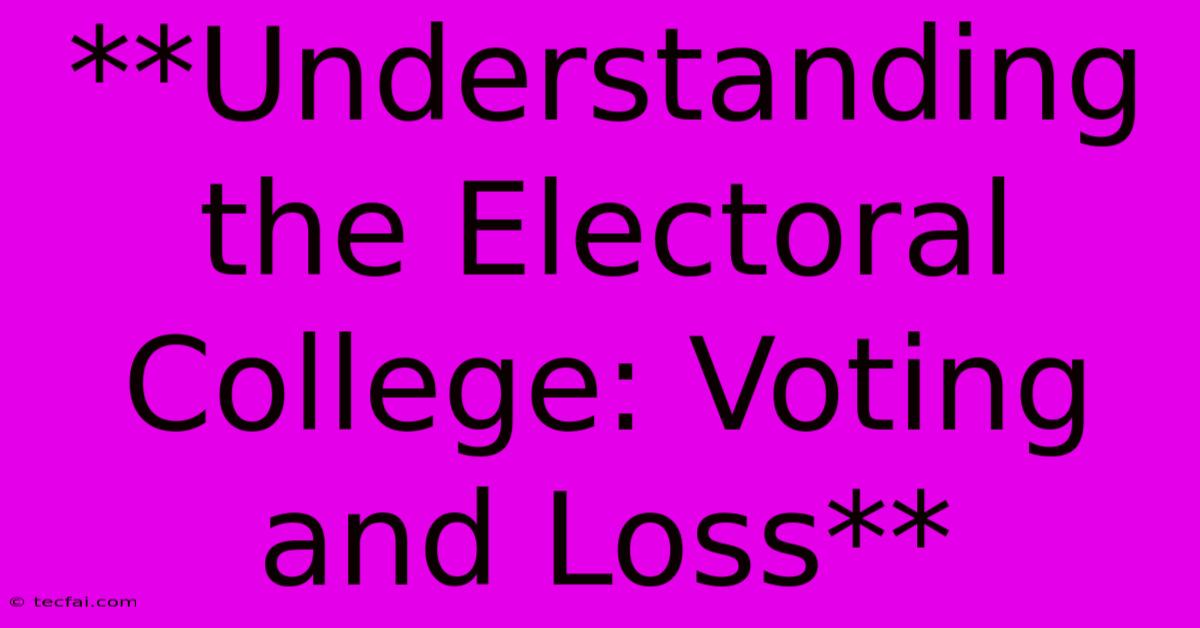**Understanding The Electoral College: Voting And Loss**

Discover more detailed and exciting information on our website. Click the link below to start your adventure: Visit Best Website tecfai.com. Don't miss out!
Table of Contents
Understanding the Electoral College: Voting and Loss
The Electoral College, a unique feature of the American presidential election system, has been the subject of much debate and scrutiny. While the popular vote often grabs headlines, it's the Electoral College that ultimately determines the winner. This article will delve into the intricacies of the Electoral College, explaining how it works and highlighting the potential for a candidate to win the popular vote but lose the election.
How Does the Electoral College Work?
Each state is allocated a specific number of electors based on its population. The District of Columbia also receives electors, with the total number of electors equaling the number of senators (100) plus the number of representatives (435) plus three electors for the District of Columbia, totaling 538.
To win the presidency, a candidate needs a majority of electoral votes, which means at least 270. The electors are chosen by each state, typically based on the popular vote within that state. The candidate who wins the most votes in a state usually receives all of that state's electoral votes, with the exception of Maine and Nebraska, which allocate their electors based on the popular vote in each congressional district.
The Potential for Disparity Between Popular Vote and Electoral Vote
The Electoral College system can create a situation where a candidate wins the popular vote nationwide but loses the election. This occurs when a candidate wins a significant number of states with large electoral vote counts, even if they lose by narrow margins in other states.
This scenario has happened five times in U.S. history, most recently in 2016 when Hillary Clinton won the popular vote by nearly 3 million votes but lost the election to Donald Trump, who secured 304 electoral votes.
Arguments for and Against the Electoral College
Supporters of the Electoral College argue that it:
- Ensures that all states have a voice in the election: The system encourages candidates to campaign in all states, not just the most populous ones.
- Protects the interests of smaller states: Smaller states have proportionally more electoral votes than their population size, giving them a greater say in the election.
- Prevents a candidate from winning the election by carrying only a few large urban centers: It forces candidates to appeal to a broader spectrum of voters and interests.
Opponents of the Electoral College argue that:
- It is undemocratic: The winner of the popular vote doesn't always win the election, which undermines the principle of "one person, one vote."
- It can lead to a candidate winning with a minority of the popular vote: This can create a sense of disenfranchisement and undermine public trust in the electoral process.
- It discourages voter participation in certain states: States where a candidate has a significant lead may see lower voter turnout as their vote is considered less influential.
The Debate Continues
The Electoral College remains a contentious topic in American politics. Proponents believe it safeguards the interests of all states and ensures a balanced representation of diverse viewpoints. Opponents argue it is an outdated system that undermines democracy and the popular will. As the system continues to be debated, its future and the implications for American democracy remain in question.

Thank you for visiting our website wich cover about **Understanding The Electoral College: Voting And Loss** . We hope the information provided has been useful to you. Feel free to contact us if you have any questions or need further assistance. See you next time and dont miss to bookmark.
Featured Posts
-
Rogan Gives Trump Presidential Nod
Nov 05, 2024
-
Nfl Trade Deadline 2024 Latest News And Analysis
Nov 05, 2024
-
Britton On Love After Phil Vickery Divorce
Nov 05, 2024
-
Wellbeing Concerns Drive Kilkenny Windfarm Protest
Nov 05, 2024
-
2024 Election Harris And Trump On Key Issues
Nov 05, 2024
